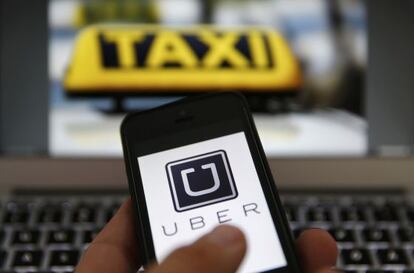Mexico City cabbies come to blows with Uber ride-share driver
Angry taxi owners used bats to attack a vehicle while the passenger was still inside


Ride-sharing service Uber has become a troublesome competitor for Mexican taxi drivers. The ongoing dispute between cabbies and the users of the application reached a climax on March 20 in Mexico City.
Before dawn, a group of taxi drivers used baseball bats to smash the windows and doors of an automobile that was transporting an Uber user in the city’s central Roma district.
It was 4am and Edgar Molina, the passenger in the vehicle, wrote on Twitter: “They came to blows with the @Uber [driver], who I called to my home, with me inside.”
La mafia de taxistas Roma - Cibeles agarraron a batazos al @Uber que pedí a mi domicilio conmigo adentro @PGJDF pic.twitter.com/9nhEBaPL9P
— Mr. Edge ❌ (@Edgar_sk) March 20, 2015
The passenger was unharmed but he later posted photos of the wrecked vehicle online.
The attackers are members of the Permanent Committee for Transportation in the Federal District, an organization made up of taxi drivers who came together last October to organize protest rallies against the online application, which is used to put passengers in touch with private drivers.
According to the group, Uber engages in unfair competition and uses “pirate taxis” to transport passengers.
“This is just the beginning of some of the measures we will be taking against piracy in all its forms. Even though we are clearly against violence, we are also tired of seeing laws not applied,” the committee published on its Facebook page, along with a photo of the damaged vehicle.
Even though we are against violence, we are also tired of seeing the law not being applied”
Mexico City is not the only place where Uber has run into problems. In December, a mercantile court judge in Spain ordered the US-based ride-sharing and taxi service to cease all operations in the country. It has this week filed a complaint with the European Commission against the measure.
In France on Tuesday, a French court issued a precautionary ruling and declined to ban Uber due to questions raised over a new transport law.
In the United States, lawmakers in various states, including Nevada, are looking at reworking local transportation regulations that could do away with services such as Uber.
Uber began its operations last August in Mexico City, Guadalajara, Monterrey and Tijuana. In the Mexican capital, the transport app has another competitor, Cabify, which operates on a similar basis. Both have been able to capture a large user base in Mexico City.
Earlier this month, Uber announced that it would reduce its fares by 10 percent with a minimum fare for service set at $2.50. The online application also said that it would soon be expanding to Puebla and Querétaro.
“The last thing Mexico needs is more violence. We vehemently reject any acts of violence or intimidation,” the company said, following the March 20 attack on one of its hire vehicles.
On the social networking sites, people have reported instances where taxi drivers have tried to stop passengers from boarding Uber vehicles.
Taxi groups have filed complaints with the Mexico City government, saying that drivers hired by Uber don’t hold licenses to provide public transport services. The annual fee for such a license in Mexico City is $308, with drivers paying additional amounts to work in certain parts of the capital.
City officials have promised to introduce new regulations that govern services offered by Uber and Cabify.
Rufino León, the federal district’s transportation chief, met last December with the company officials to draft a plan to regulate vehicles but at the moment the city has not come up with any new laws. At the same time, no fines have been issued against any of Uber’s drivers.
Tu suscripción se está usando en otro dispositivo
¿Quieres añadir otro usuario a tu suscripción?
Si continúas leyendo en este dispositivo, no se podrá leer en el otro.
FlechaTu suscripción se está usando en otro dispositivo y solo puedes acceder a EL PAÍS desde un dispositivo a la vez.
Si quieres compartir tu cuenta, cambia tu suscripción a la modalidad Premium, así podrás añadir otro usuario. Cada uno accederá con su propia cuenta de email, lo que os permitirá personalizar vuestra experiencia en EL PAÍS.
¿Tienes una suscripción de empresa? Accede aquí para contratar más cuentas.
En el caso de no saber quién está usando tu cuenta, te recomendamos cambiar tu contraseña aquí.
Si decides continuar compartiendo tu cuenta, este mensaje se mostrará en tu dispositivo y en el de la otra persona que está usando tu cuenta de forma indefinida, afectando a tu experiencia de lectura. Puedes consultar aquí los términos y condiciones de la suscripción digital.








































